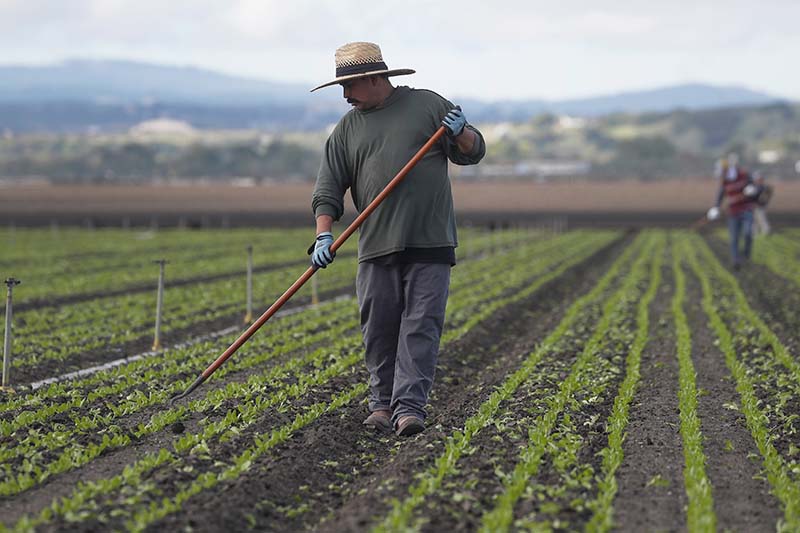WASHINGTON (OSV News) — Points of tension have emerged between the Trump administration and the agriculture industry over the president’s immigration policy.
Some mixed messaging has resulted from the White House toward immigration policy for farmworkers–and toward an agriculture industry that heavily relies on immigrant labor–as the administration seeks to enforce its hardline immigration policies.
Vice President JD Vance appeared to acknowledge this tension in comments July 23 at a taping of the “All-In” podcast at the Hill & Valley Forum, suggesting “automation” might be a path forward.
‘We’re Not Going to Do Amnesty’
“What the President has said is, number one, we’re not going to do amnesty in this country,” Vance said. “We’re actually not going to tell people who have come into the country illegally that they’re allowed to break our laws and be rewarded for it. We’re just not going to do that.”
Vance said “agricultural industries and others” have told them, “Well, you know, we really need labor.”
“Well, there are a whole host of ways in which you can try to solve those problems,” Vance said. “My favorite solution for those problems is automation. I actually think there’s a lot of evidence that the American agricultural economy is a little behind the eight ball when it comes to using technology.”
In recent weeks, President Donald Trump floated what he described as a “temporary pass” for immigrants who work in certain industries, like agriculture and hospitality, but immigration officials walked back his comments, saying they would continue “worksite enforcement.” However, White House border czar Tom Homan later said that potential changes may still be forthcoming for farmworkers.
Immigrants Do Much of Seasonal Labor
Erin Corcoran, an associate teaching professor and executive director of the Kroc Institute for International Peace Studies at the University of Notre Dame, told OSV News, “One of the things that I think people may or may not really understand is that so much of the labor that’s done in the United States, particularly labor that is seasonal, is done by immigrants, both documented and undocumented immigrants.”
Some examples of such seasonal agricultural labor, she said, include crab picking in Maryland, cider pressing in New Hampshire, and roe fishery (fish eggs) in Alaska.
“Farming is seasonal, and the labor needs fluctuate based on when the season is peaking, the growing season, the picking season, and those are oftentimes jobs that are really hard to fill with people who are looking for full-time work,” Corcoran said.
Seasonal farmworkers without citizenship or other legal status primarily use either the H-2A or H-2B visa programs, both for temporary workers, Corcoran said.
Migrant Labor ‘Fuels’ U.S. Economy
“I think it’s this tension with this administration wanting to kind of crack down on anyone who doesn’t have any kind of valid immigration status, across the board, a blanket kind of crackdown, but not really appreciating at the same time that a lot of work that’s being done to fuel our economy is being done by immigrants, both with valid status and with no valid status,” Corcoran said.
Corcoran said that adjusting a cap on the H-2B visa program to allow more workers to come each year could be one way to resolve some tension by granting more workers legal status.
“H-2B has very, very small caps, which then forces people to apply for other immigration statuses or to just not use the immigration system that exists,” she said.
Reducing the complexity of crossing the border for people from Mexico or Canada with temporary visas, she added, would also incentivise allowing people to move more freely, and even in some cases return home across the border at the end of their daily shifts.
‘Flip-Flopping by Administration’
J. Kevin Appleby, senior fellow for policy at the New York-based Center for Migration Studies and the former director of migration policy for the U.S. Conference of Catholic Bishops, told OSV News, “The administration’s flip-flopping on whether to deport agricultural and hospitality workers unveils the folly of their mass deportation campaign.”
“They are starting to realize how important immigrant workers are to the economy,” Appleby said. “I would argue that the large majority of the immigrants who they are targeting work in essential industries, such as construction, health care, home care, and landscaping, to name a few.”
Catholic social teaching on immigration seeks to balance three interrelated principles: the right of persons to migrate in order to sustain themselves and their families, the right of a country to regulate its borders and immigration, and a nation’s duty to conduct that regulation with justice and mercy. Catholic social teaching also upholds the dignity of work and the rights of workers.
“The argument that Catholic advocates should make to the administration is clear: If you are not going to deport them because of their importance to our economy, you must give them legal status to protect them and their rights,” Appleby said. “Otherwise they are left vulnerable to their unscrupulous employers, who will pay them nothing and force them to work in substandard conditions.”
Kate Scanlon is a national reporter for OSV News covering Washington. Follow her on X @kgscanlon.




